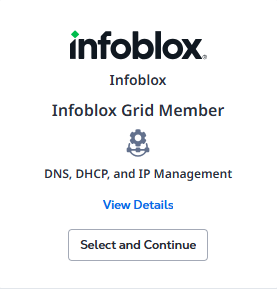An Infoblox device can be created on Network Edge. You can create single, redundant, or cluster devices.
To create a single Infoblox device:
- Sign in to the Equinix Customer Portal and navigate to Network Edge.
-
From the Network Edge menu, select Create Virtual Device.
- Click Select and Continue on the Infoblox card to start the device creation workflow.

Note: Click View Details to see a preview of the configuration options available for this virtual device.
- Select a Deployment Type (Single or Redundant Device). If you select Redundant Device, follow the workflow and select the Redundancy option. (Create a new pair of redundant devices or add an additional device to an existing device.)
- Click Begin Creating Edge Devices.
- In the Select Edge Device Location section, click a location.
-
In the Account section, select a billing account from the Your accounts in this metro drop-down. If you want to create an account to order and deploy across any location, click Create Billing Account and follow the workflow to create a global billing account. For more information about global accounts, see the Creating a Billing Account via Ordering New Network Edge Virtual Device section of Billing Account Management.
-
Click Next: Device Details.
-
Connectivity Type defaults to Without Equinix Public IP Address.
-
Licensing defaults to Bring your own License.
-
In the Device Resources section, select the virtual machine resource type, along with the Software Package and Software Version.
-
In the Device Details section enter:
-
Device Name – Click
 to see the device naming rules.
to see the device naming rules. -
Host Name Prefix – Click
 to see the host naming rules.
to see the host naming rules. -
Admin Password (Optional)
-
IP Address (Optional)
-
Subnet Mask
-
Default Gateway
-
-
In the Interfaces section, the default 4 interfaces is the only option.
- In the Notifications box, enter the email addresses of anyone who should receive email notifications regarding device status. For each email address, select the Device status notifications and or Incident and maintenance notifications options.
-
(Optional) In the Optional Details box, enter the Purchase Order Number and Order Reference/Identifier.
-
In the Term Length drop-down menu, select a term length.
-
Click Next: Additional Services to add any additional services. (Only one additional service is available for this device type.)
- Click Next: Review and review your order.
- In the Shared Support Structure box read the information and click I have reviewed this support policy and acknowledge it.
- Click Create-Virtual Device.
| Deployment Type | Description |
|---|---|
| Single | Provision a single device that operates as a standalone device. Another single device can be paired with the existing single device (requires same resource configuration) to form a local redundancy (redundancy in single metro) or geo-redundancy (each device operates in different metro). |
| Redundant | Provision two devices. Each device operates individually, and you are responsible for configuring those in an Active-Active fashion. You have the option of deploying both devices in two different metros (recommended) to achieve distributed architecture or keep both devices in the same metro. |
| Cluster | Provision multiple devices with Active-Standby redundancy in a single metro. |

Note: We strongly recommend adding multiple email addresses so that more than one user receives any notification for this device.


